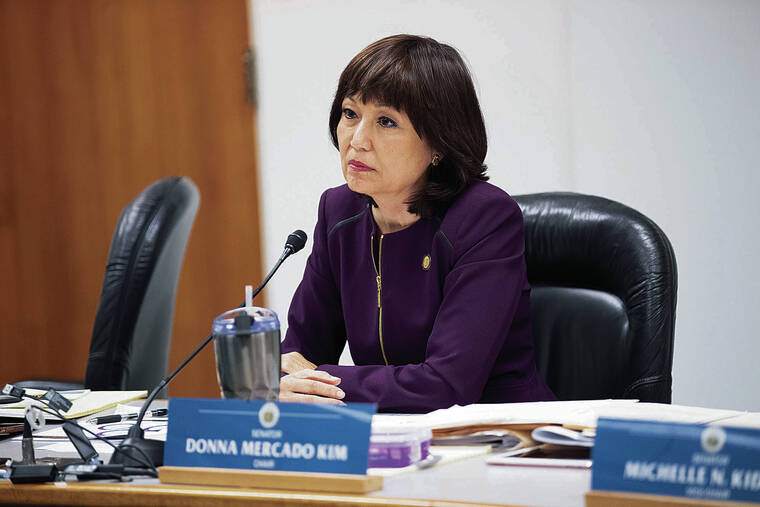A bill that would establish a new authority to oversee the stewardship of Mauna Kea’s summit advanced in the state Senate on Wednesday with changes intended to provide a more gradual transition away from the University of Hawaii.
The Higher Education Committee voted to approve HB 2024 with a range of amendments offered up by committee Chairwoman Donna Mercado Kim.
The measure, as originally written, establishes an oversight entity with Native Hawaiian representation that has independent authority over the state-managed lands on the mountain following a three-year transition period
With the amendments, UH Hilo would take on a greater role in the transition.
“I tried to strike a balance with a gradual transition, because … there are a lot of moving parts and to put in a completely new entity and to expect them to get running in three years is a huge task,” Kim said.
University officials previously said the bill does not allow enough time for the new authority to carry out the complicated process of renewing observatory subleases and securing a new land authorization for the summit before the telescopes are forced into a lengthy decommissioning process prior to the expiration of the master lease in 2033.
The tight timeline, they said, would effectively lead to the end of astronomy atop Hawaii’s tallest mountain, a major blow to a
$110 million industry in the islands and to the university’s prestigious Institute for Astronomy.
In her remarks Wednesday, Kim said she wasn’t sure the current bill would achieve all that it envisions without overburdening the taxpayers or addressing the needs of the University of Hawaii’s astronomy program.
“However, I do believe that, as a state, we need to move towards real systematic change in a manner that does not further divide our communities,” she said. “This proposed Senate draft is by no means a perfect bill, but it does address concerns raised by various state agencies and the community.”
Under the proposed amendments, the authority would be placed under the umbrella of UH Hilo for administrative purposes, and the chancellor would become an ex-officio nonvoting member of the board.
Day-to-day operations would be led by the director of UH Hilo’s Center for Maunakea Stewardship for at least three years and would be tasked with helping the authority to obtain land authorization and
address the telescope
subleases.
The university would also be required to continue to fund the authority and do it equitably while making the new entity
financially sustaining beginning the first year after the three-year transition period.
Kim said it was important to remove UH President David Lassner and the Board of Regents from oversight of the mountain because they have been derelict in not moving faster to promulgate rules and have created divisiveness in the community.
“If this was a corporation in the private sector, those in charge — the
regents and UH president — would have been held accountable and probably terminated,” she said.
Kim said UH is an educational institution, not a land manager.
“They have a lot on their plate,” she said. “Mauna Kea deserves and needs an oversight authority that
is 100% dedicated to its
mission.”
The university declined to comment on the amendments as officials were still reviewing the changes, spokesman Dan Meisenzahl said.
The measure now heads to the Senate Committee on Ways and Means for
further consideration.
Other key amendments, if approved, would:
>> Authorize the authority to develop a framework “to allow astronomy development on Mauna Kea.”
>> Require the authority to continue giving UH
viewing time at the telescopes.
>> Require an audit of the authority after the seventh year, and if the audit finds the entity unfit to continue, the management would revert to the UH Board of Regents and
UH president.
>> Add a representative of the Mauna Kea observatories to the authority’s 11-member board.

